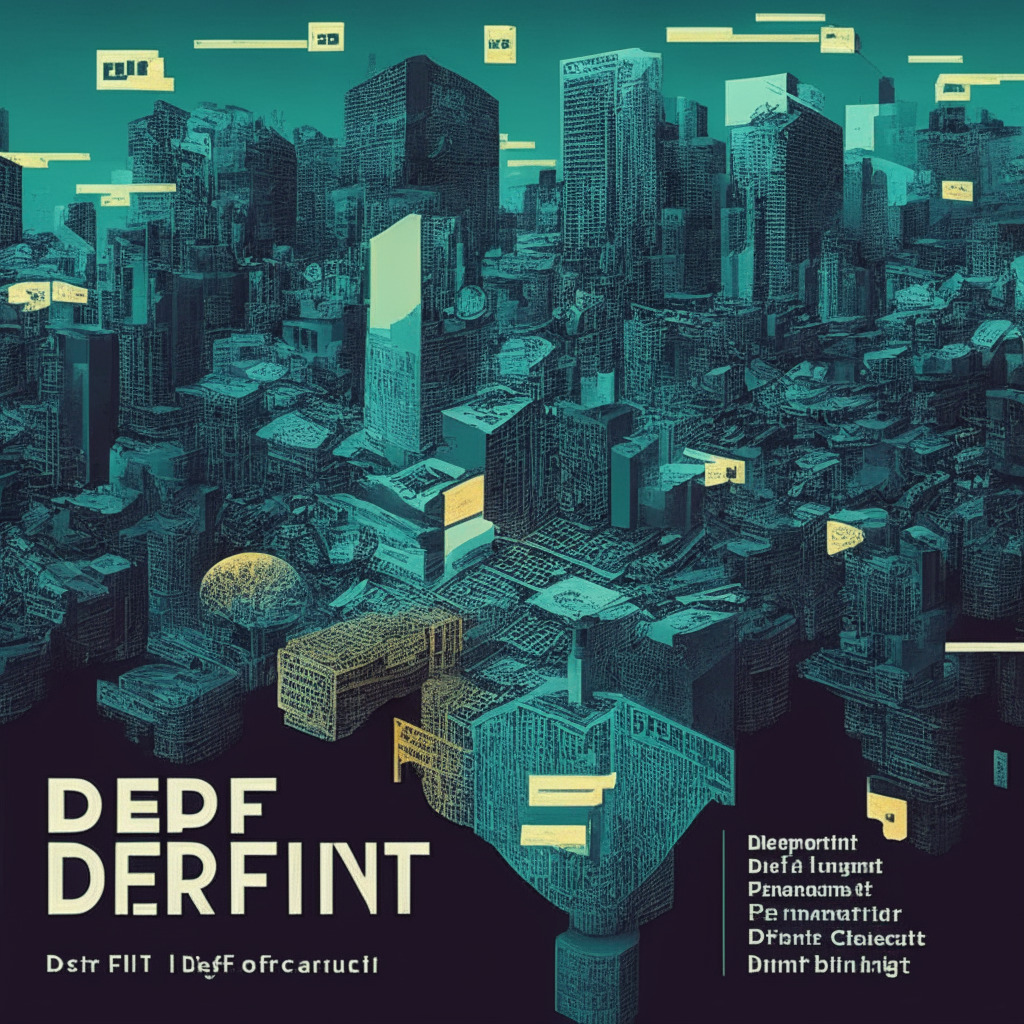Bitcoin price eyes $30,000 as BTC/USD spikes to new May high amid ongoing market jitters from the U.S. banking crisis impacting regional banks. Investors and analysts closely watch the dynamic financial environment and Bitcoin’s struggle to reclaim lost ground, with potential risks and opportunities in the ever-evolving landscape.
Search Results for: BANK UNITED
Bankrupt Voyager’s Liquidation Plan: Relief for Creditors Amid Binance.US Deal Fallout
Creditors of bankrupt crypto broker Voyager Digital may see relief as the firm approaches the final stages of bankruptcy liquidation procedures. After Binance.US backed out of a $1.02 billion deal to purchase Voyager’s assets, the broker can now pursue self-liquidation and distribute assets to customers via the Voyager platform.
Bitcoin’s Potential 20% Gain Amid US Banking Crisis: Boon or Risk?
Recent data from Matrixport suggests a narrowing wedge pattern in the cryptocurrency market could lead to a 6,100-point increase in Bitcoin’s price, reaching $35,000-$36,000. Factors supporting this potential uptrend include a record-high number of transactions, nearly 1 million active addresses, and a possible crypto rally amid the ongoing banking crisis.
US Banking Crisis Impact on Bitcoin: Decline vs Opportunity for Investors
The US banking crisis raises concerns about the overall financial system, with Bitcoin’s recent slide below $29,000 reflecting market jitters. Amidst skepticism of the economic infrastructure, investors may turn to cryptocurrencies like Bitcoin for stability, while carefully monitoring market trends.
Crypto Markets Stagnate Amid Regulatory Uncertainty and Banking Crisis Concerns
Cryptocurrency markets have been trading within a narrow range due to regulatory uncertainty, primarily in the US. Investors await clarity on rules for digital assets and the US Treasury’s plan for addressing the banking crisis. Professional traders do not predict a crypto price crash but emphasize diligent research and risk assessment in volatile markets.
Democratic Candidate Links Anti-Crypto Sentiment to Bank Failures, Sparks Debate
Presidential candidate Robert Kennedy challenges anti-crypto sentiment within the Democratic party, attributing regulatory agencies’ “war on crypto” to several bank failures in March. He criticizes the FDIC and SEC for targeting crypto and leaving banks as collateral damage while expressing concerns about the suspected “Operation Chokepoint 2.0” government conspiracy.
Banking Crisis vs Digital Assets: The Financial Revolution Beckons
Amidst financial chaos in the banking industry, digital assets and decentralized finance (DeFi) emerge as beacons of hope, offering opportunities for a new financial system focusing on access, inclusivity, and self-autonomy, potentially revolutionizing traditional banking with blockchain technology.
Bankrupt Crypto Lender Celsius’ Struggles: A Tale of Regulation, Oversight, and the Future
This article highlights the importance of proper regulation and oversight in the cryptocurrency market, using the case of bankrupt crypto lender Celsius and its alleged poor record-keeping as an example. The ongoing conflict underscores the need for a balanced approach embracing necessary regulations while allowing for innovation and growth in the crypto sphere.
Bitcoin’s Battle at $28,000: Can BTC Hold On Amid Banking Crisis and Weakening USD?
Marcel Pechman explores Bitcoin’s $28,000 support amid its recent failure to break $30,000 resistance, leveraging impact on price, and U.S. banking issues affecting the digital asset. Various indicators suggest opportunities for both bulls and bears, as well as potential long-term benefits for Bitcoin in light of a weakened U.S. dollar.
Bitcoin Dips Amid Bank Crisis & Upcoming FOMC Decision: Analyzing Crypto Market Impact
Bitcoin (BTC) has recently experienced a dip below $28,000, following a downward trend that began […]
Biden’s Confidence in Banking Amid Defaults: Fact or Fiction? Pros, Cons, and Conflicts
Amid the recent collapse of the second, third, and fourth largest banks in American history, […]
Banking Crisis Brewing: Crypto’s Booming Potential or Fed’s House of Cards?
Arthur Hayes, the co-founder of cryptocurrency exchange BitMEX, has taken to Twitter to express his […]
Banking Crisis Fuels Crypto Surge: How NvirWorld’s Deflationary Coin Promises a Web3 Revolution Amid Bullish Predictions
The recent banking crisis in the United States, which saw the bankruptcy of the Silicon […]
Banking Jitters Impact Bitcoin: Analyzing BTC’s Plunge and the Wall Street Connection
As the cryptocurrency world ponders the impact of the fresh United States banking jitters, Bitcoin […]
Legacy Banking Vulnerabilities vs. Blockchain’s Promise: Analyzing Bitcoin and Altcoin Market Trends
JPMorgan Chase recently acquired the deposits and a majority of assets from the troubled First […]
Signature Bank’s Collapse: How Poor Management and Crypto-Connections Led to a Banking Breakdown
The collapse of Signature Bank of New York (SBNY) has been a hot topic of […]
Banking on the Brink: A Domino Collapse Looming as First Republic Bank Stumbles and the Role of Crypto
The future of regional banks in the United States hangs in the balance as the […]
Banking on the Edge: How Crypto-Friendly Policies and Regulatory Easing Led to a Series of High-Profile Bank Failures
The recent series of high-profile bank failures in the United States has sparked intense debate […]
The Battle of Blockchain Founder in Court: Bias, Intrigue and Financial Chaos
The jury selection process continues in the trial of FTX’s founder, Sam Bankman-Fried. Prospective jurors’ potential biases and previous financial losses in cryptocurrency pose as complexities. Judicial proceedings reveal the growth of blockchain technical jargon within the legal sector. Bankman-Fried’s charges include conspiracy, fraud, and unlawful customer deposit lending, putting the crypto world’s intersection with the traditional legal system under spotlight.
The Fall of FTX: A Tale of Fraud, Billion-Dollar Losses, and the Uncertain Future of Crypto
“In a recent blockchain trial, Sam Bankman-Fried is accused of misuse of FTX user funds. His ex-business partner alleges that under his direction, she fraudulently withdrew and invested billions from Alameda. This highlights ongoing concerns over crypto regulation, security, and transparency.”
Binance’s Freeze on Hamas-linked Accounts: A Complex Crypto Dilemma
“Binance, a cryptocurrency exchange, has frozen accounts linked to Hamas at the request of Israeli law enforcement. This action highlights the potential role of crypto exchanges in enforcing international laws and curbing illegal activities, and raises questions about the balance between accessibility and security in blockchain tech and cryptocurrencies.”
Unraveling the Complex Quest for Australia’s Digital Currency: CBDC Exploration and Challenges
The US-based Atlantic Council think tank reported that over half of 130 countries are piloting or launching central bank-issued digital currencies (CBDCs). However, Australia’s journey toward an Aussie digital currency (eAUD) faces complexities, including legal, regulatory, and operational challenges, despite progress made by Blockchain firm Canvas.
Future of Crypto: Electronic Fund Transfer Act Impact on Digital Currencies
The Consumer Financial Protection Bureau (CFPB) is contemplating applying the Electronic Fund Transfer Act (EFTA) to cryptos. This measure aims at protecting consumers from unauthorized transfers, errors, or hacks related to digital assets. Amid the exponential growth in crypto-platform hacks, CFPB’s move suggests increased accountability for crypto-related financial institutions.
Decoding The Future: Blockchain, Bitcoin, and the Fear of Centralized Digital Currencies
“Blockchain technology and cryptocurrencies are transforming financial infrastructures, providing a decentralised exchange method. Cryptocurrencies like Bitcoin could pave the way for a transparent, corruption-free global currency. However, concerns about government control, environmental impact, and the implications of Central Bank Digital Currencies (CBDCs) are also emerging.”
The Dance of Regulations and Crypto: Boon or Bane to the Blockchain Future?
The former CEO of Voyager Digital, now under regulatory scrutiny for allegedly violating U.S. derivatives regulations, views these allegations as retrospective application of rules. This comes after Voyager’s bankruptcy and amid investigations into its unfair marketing practices. Regulations, while possibly seen as constraints, can provide stability and customer protection in the crypto market.
Pivotal Move: How the UK’s Regulatory Changes Could Shape the Global Crypto Landscape
“The United Kingdom could potentially leapfrog the US in Web3 crypto environments, contingent on an unconventional regulatory trajectory. Changes like curbing liabilities for DAO token holders and amending FCA’s KYC guidelines could catalyze growth in emerging technologies. Nonetheless, the crypto evolution is challenged by potential misuse and regulatory hurdles.”
Mandating Full Crypto Holdings Disclosure: Basel Committee’s Bold Move towards Transparency
The Basel Committee on Banking Supervision intends to mandate banks to disclose their cryptocurrency holdings fully, aiming to bolster transparency. They will detail disclosure requirements for bank’s exposure to crypto assets, with the objective to prevent potential risks within the financial ecosystem. Using this approach, the committee hopes to create increased crypto transparency.
Dutch Crypto Companies Battle Regulatory Fees: A Win for Blockchain or a Barrier to Growth?
The Dutch court has ruled against the Dutch Central Bank’s (DNB) imposed fees on crypto companies for anti-money laundering compliance, stating a violation of EU law. While the DNB argued that the industry should shoulder these costs, crypto firms believed these fees hindered the growth of the Netherlands’ digital currency sector.
Crypto Mogul’s Private Jets: Legal Ramifications and the Quest for Regulation in Crypto Exchanges
The US Department of Justice might seize crypto mogul Sam Bankman-Fried’s private jets over allegations of illegal fund use. This ownership dispute involves FTX, the frequent-flyer mogul’s cryptocurrency exchange, the US government, and participating aviation companies. While he pleads not guilty to all charges, the case raises serious questions about crypto trading platforms’ reliability, security, and transparency.
Crypto Regulation vs Innovation: DoJ Case & France’s CBDC Vision Unveil the Blockchain Dichotomy
“DoJ asserts that absence of specific US crypto regulation does not invalidate criminal charges against Sam Bankman-Fried, former FTX CEO. Existing laws against misappropriation of customer assets still apply. This situation highlights imbalances in current crypto regulations, where extant laws can yield harsh punitive consequences in new situations.”
Unleashing the Bull: Bitcoin’s Prospects Amid Rising U.S Treasury yields and Looming Economic Unrest
Recent developments in the US economy, such as rising treasury yields and national debt, suggest a bullish future for Bitcoin. Former crypto exchange CEO, Arthur Hayes, speculates this could lead to mass liquidity injections, possibly triggering a Bitcoin bull run. However, the volatile interplay between these economic factors also warrants caution.
Former Celsius Network CEO Set for Courtroom Drama: A Deep Dive into Crypto’s Legal Wranglings
“The former CEO of Celsius Network, Alex Mashinsky, is expected to go to trial on charges of misleading investors and claiming billions from users. This case traces back to Celsius Network’s bankruptcy and Mashinsky’s resignation in 2022, causing the initiation of legal cases by several U.S. government bodies. The outcome awaits and reflects larger narratives in cryptocurrency legal affairs.”































